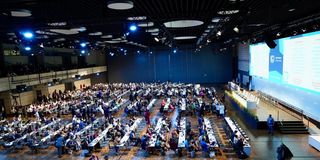Climate negotiations finally begin after two-day standoff in Bonn

Delegates await the official opening of climate talks in Bonn, Germany amid tense wrangling over the meeting ‘s agenda.
What you need to know:
- For Kenya and other African nations, adaptation financing remains the top priority.
- Current funding of $20 billion falls $347 billion short of what's needed, according to UN estimates.
- Some countries want to triple adaptation finance to $120 billion, bringing it closer to the amount spent on emissions reduction.
After two days of diplomatic deadlock, global climate negotiations have finally begun in Bonn, Germany, but not before exposing the deep divisions that could derail this year's crucial COP30 summit in Brazil.
The standoff began when Bolivia introduced two "contentious items" to the agenda that wealthy nations wanted to block, forcing delegates from 196 countries into marathon closed-door sessions at the World Conference Centre. Kenya and other developing nations backed Bolivia's push to include binding financial commitments from rich countries under Article 9.1 of the Paris Agreement.
The agenda fight was about far more than procedure. With just 150 days until COP30 in Brazil, these Bonn talks will determine whether the world can make progress on three critical issues: helping vulnerable countries adapt to climate impacts, ensuring a fair transition away from fossil fuels, and mobilising the $300 billion in climate finance promised at last year's summit in Baku, Azerbaijan.
What's at stake
The most immediate battle centers on the Global Goal on Adaptation, where negotiators must finalise indicators to track how well countries are protecting their people from floods, droughts, and rising seas. Technical experts have already whittled down 9,000 potential measures to 400, with the final list of about 100 indicators to be decided here.
For Kenya and other African nations, adaptation financing remains the top priority. Current funding of $20 billion falls $347 billion short of what's needed, according to UN estimates. Some countries want to triple adaptation finance to $120 billion, bringing it closer to the amount spent on emissions reduction.
"For many countries in the developing world, adaptation means saving lives and protecting livelihoods from collapse," said Richard Muyungi, chair of the African Group of Negotiators.
The talks will also address the "just transition" work programme - ensuring the shift to clean energy doesn't leave workers and communities behind. This initiative flopped at COP29 in Baku, adding pressure for progress in Bonn.
The money fight
Behind the procedural battles lies a fundamental disagreement about climate finance. Developing countries insist that the $300 billion pledged in Baku must come from government budgets of wealthy nations as required under UN climate agreements. Rich countries want to include private investment in meeting these commitments.
"Promoting private finance is a ploy by developed countries to shift their obligation from governments to private companies," warned negotiators from the Global South. They argue that businesses will only fund profitable projects while ignoring life-saving interventions with minimal returns.
Saada Mohamed from climate think tank Power Shift Africa, who is following the finance negotiations, noted that while the delays created tension, they also provided "a window to capture the interests of developing countries in the main agenda."
Brazil, which will host COP30 in November, had warned against agenda items that could derail preparations for the summit. COP30 President André Aranha Correa Do Lago has called for a "new era" in climate negotiations where decisions drive real economic transformation rather than just producing more text.
Brazilian diplomats came to Bonn seeking an "early harvest" on key issues to ensure COP30 can focus on implementation rather than getting bogged down in the same fights that have stalled progress for years.
The agenda standoff suggests that that goal may be harder to achieve than Brazil hoped. As one negotiator told the Nation, such delays "while fraught with tension, are not unusual in the climate process."
With the agenda now adopted, negotiators will spend the coming days battling over the details that could make or break global climate action. Success in Bonn could set up breakthrough agreements in Brazil. Failure could mean another year of missed opportunities while the planet continues warming.
For climate-vulnerable countries like Kenya, the stakes couldn't be higher. The outcomes here will determine whether they get the financial support needed to protect their people from increasingly severe climate impacts, or whether they'll be left to face the crisis largely on their own.
The next few days in Bonn will show whether the international community can move beyond procedural battles to deliver the urgent action the climate crisis demands.


